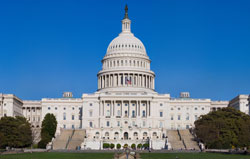As the House and Senate begin reconciling their respective bills to reach a final deal to send to President Obama, 12 state attorneys general are urging Congress to keep a strong role for state governments to act on dangerous chemicals. There’s a lot at stake, they say in a January 19 letter, because states have historically done the hard work of regulating chemicals in the absence of a working federal law.
“[C]ooperative exercise of regulatory authority has been an important tool for reducing risks to our residents and the environment from toxic chemicals,” they write, and “we strongly believe that preemption of state actions beyond that of existing TSCA is counterproductive.” (Emphasis added.)
While TSCA, the Toxic Substances Control Act, has largely failed in allowing EPA to regulate chemicals, it has successfully allowed states to enact dozens of laws that protect public health. Unfortunately, both the House and Senate bills block states to varying degrees. That’s got state officials and advocates in our national coalition very concerned that reform could be counterproductive in some critical ways.
Our partners at the Environmental Health Strategy Center recently issued a handy chart that helps sort out this complex issue. A top concern is a Senate provision that starts blocking state action before EPA decides whether it may –or may not– clamp down on a hazard. EPA’s decision process could take years on any single chemical, so blocking states so early violates the AGs first principle for reform, that “states should not be preempted until EPA has taken a final action.” (Once again, emphasis added.)
You can help make sure TSCA reform is productive instead of counterproductive. Take action here!




